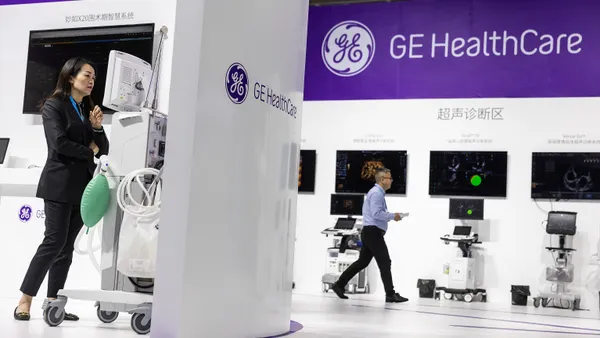Dive Brief:
- Final results from postmarket surveillance studies of Boston Scientific's transvaginal mesh for pelvic organ prolapse have reinforced FDA's unfavorable view of the benefit-risk profile.
- FDA said final reports from the 36-month studies found Boston Scientific's transvaginal POP mesh and native tissue repair were similarly effective. Safety outcomes were similar, too.
- However, FDA said the additional risks associated with transvaginal POP mesh repair, such as mesh exposure and erosion, mean it "continues to believe that these devices do not have a favorable benefit-risk profile."
Dive Insight:
FDA told 34 manufacturers of surgical mesh for transvaginal repair of POP to perform postmarket surveillance studies after a public meeting of the Obstetrics and Gynecology Devices Panel in 2011. The request prompted most mesh manufacturers to drop out of the market, but Boston Scientific and Danish device maker Coloplast sought to adapt to the new regulatory requirements.
Neither company has a commercially available device for transvaginal repair of POP today but they have had to follow-up subjects already enrolled in the postmarket surveillance studies previously ordered by FDA. The results of two Boston Scientific studies are now in.
"The study results showed that Boston Scientific transvaginal POP mesh had similar effectiveness and safety outcomes to native tissue repair at 36 months. However, patients with transvaginal POP mesh repair are exposed to additional risks, including mesh exposure and erosion, compared to patients who underwent native tissue repair," FDA wrote in its summary of the results.
Based on the findings, FDA said it "continues to believe that these devices do not have a favorable benefit-risk profile." FDA expects Coloplast to submit its final study report in February.
Boston Scientific submitted results from postmarket studies of its Uphold LITE transvaginal mesh and XenForm biologic mesh to FDA last year. The studies found the devices were non-inferior to native tissue repair for safety. There were no reports of mesh erosion in either study. However, there were cases of mesh exposure. Almost 5% of recipients of Uphold LITE experienced mesh exposure within 36 months.
To FDA, the results support its 2019 decision to tell Boston Scientific to stop selling and distributing surgical mesh products for the transvaginal repair of POP immediately. FDA based its decision on an advisory committee recommendation to require superior product effectiveness and comparable safety to native tissue repair at 36 months. Success rates were numerically higher in the mesh arms of the Boston Scientific studies but the difference fell short of statistical superiority.
Earlier this year, the California Department of Justice announced that Boston Scientific would pay $188.6 million to 47 states and the District of Columbia to settle allegations that it deceptively marketed the transvaginal surgical mesh devices to patients. The medtech did not admit any wrongdoing.











